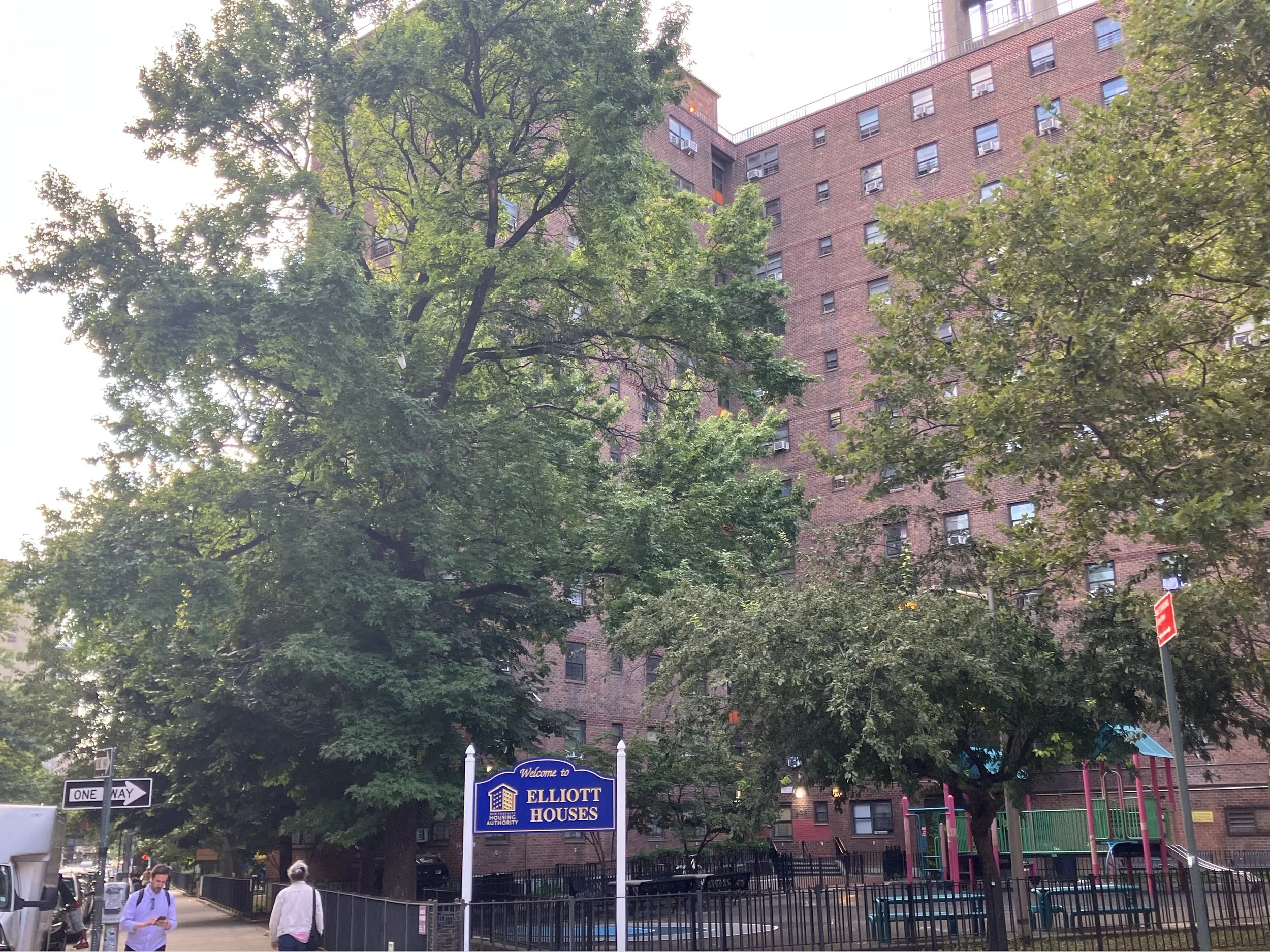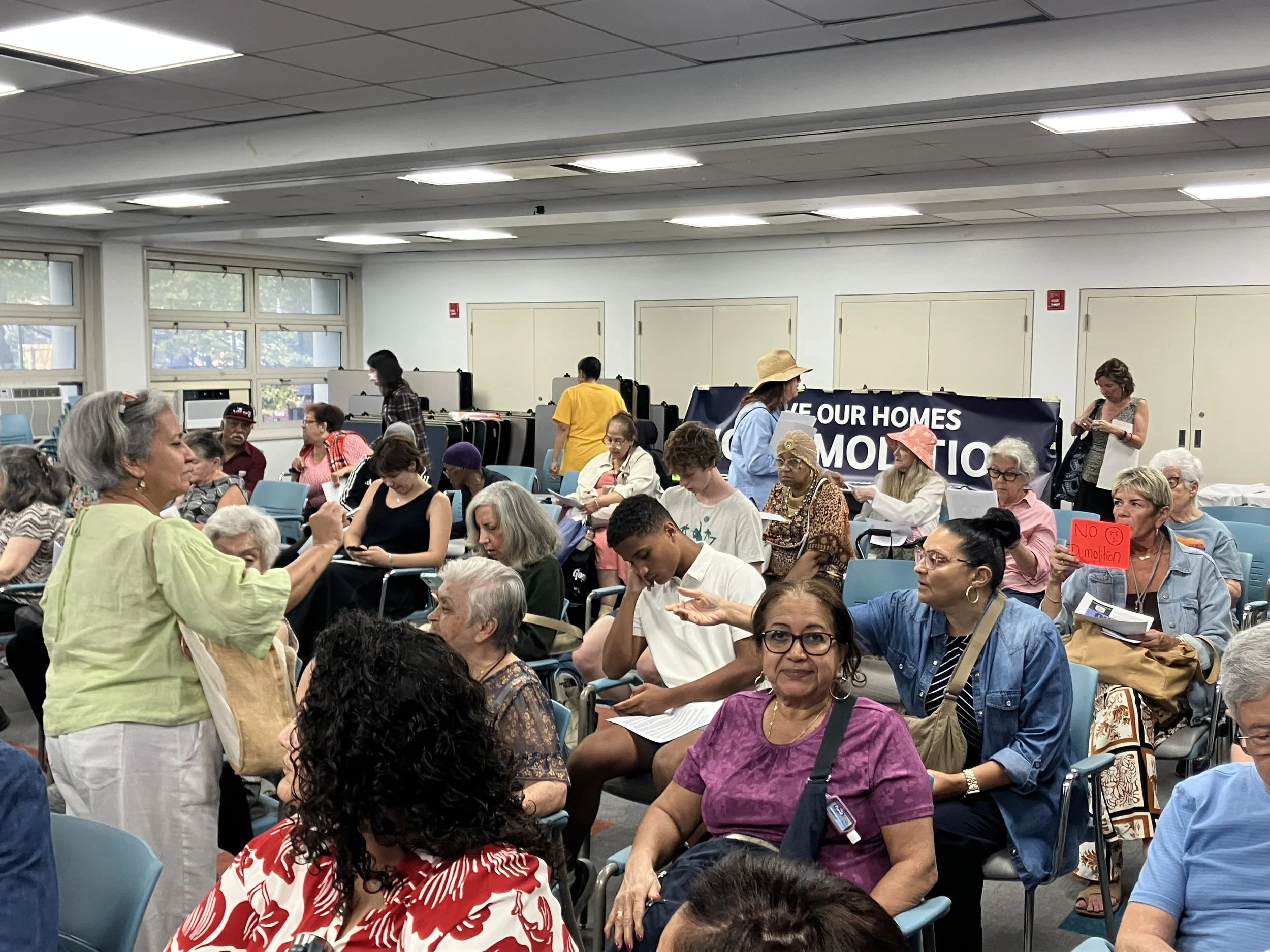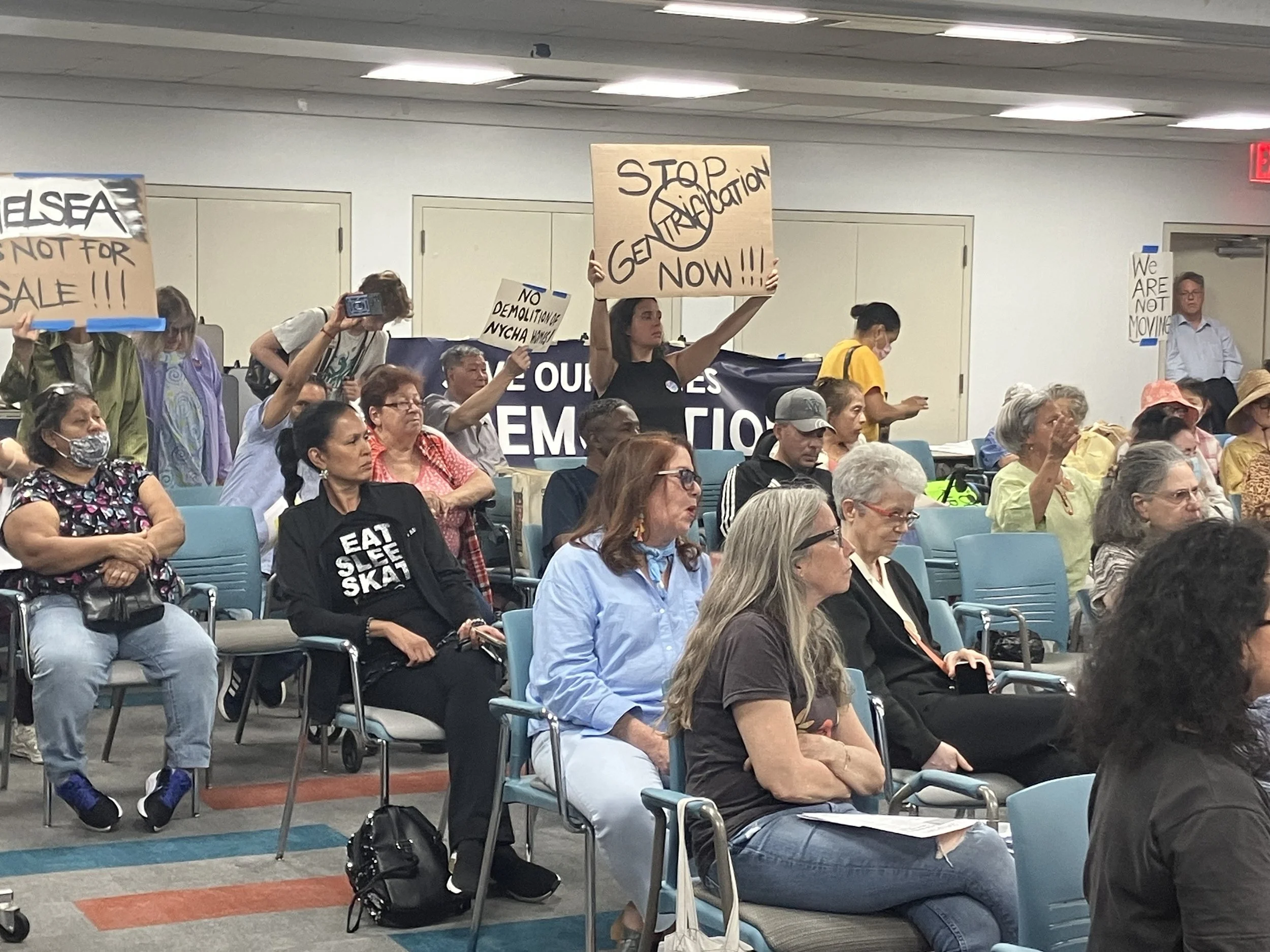Fight for the Future: Demolition Just Doesn’t Add Up for Chelsea’s Working Class
This working class neighborhood in Chelsea is slated to be completely changed forever if demolition plans are not soon overturned. Photos/Joe Maniscalco
Editor’s Note: Please be advised the venue for Community Board’s Sept. 3 meeting has been changed to Mt. Sinai West, 1000 10th Avenue, 2nd floor Conference Room B.
By Joe Maniscalco
Last fall, New York City Mayor Eric Adams proudly announced the “next phase of work” at the Fulton and Elliott-Chelsea Houses in Manhattan saying his administration and private developers were “rewriting the future of public housing across New York City.”
Chelsea residents fighting the planned demolition of their homes so that Related Companies and Essence Development can make way for a slew of new market rate housing in the Chelsea neighborhood in exchange for a much smaller dose of so-called “affordable” housing agree. They say the future of public housing is being rewritten—but in all the wrong ways.
“I think it’s [elected officials] playing to the people who will fund their campaigns,” Renee Keitt, president of the Elliott-Chelsea Tenants Association, told Work-Bites this week. “I think it's time to stop playing these games—we all see through unaffordable ‘affordable housing.’”
Keitt beat out an incumbent to become head of the Elliott-Chelsea Houses Tenants Association in January running on a fiercely anti-demolition platform. Last week, the TA president was among a majority group of Chelsea residents who packed Community Board 4’s Land Use Committee meeting on W. 26th Street to testify against the plan to demolish their homes.
The Adams administration, along with New York City Housing Authority, city Department of Housing Preservation and Development and the federal Department of Housing and Urban Development, are ignoring those voices, however.
They are instead bent on turning over the keys to the Fulton and Elliott-Chelsea Houses to the developers behind the massive Hudson Yards project so that they can level the entire community and erect six new towers—each up to 39 stories tall—in its place.
Chelsea residents opposed to plans to demolish their existing homes begin packing last Tuesday’s Community Board 4 Land Use Committee meeting held on W. 26th Street.
In addition to those towers, Related and Essence also plan to pack in as many as 10 additional new buildings onto the site to accommodate up to 3,454 new apartments—70 percent of them “market rate units” priced far out of reach of the roughly 50 percent of rent-burdened New Yorkers currently spending more than a third of their income on rent and utilities.
Residents living in 114 units at the Chelsea Addition and Fulton Building 11 have already been told they’ve got to pack their bags and go. But not to worry, according to the city, they can come back once their new apartments are ready—in approximately three or four years.
That’s little comfort to tenants and their families about to have their lives turned inside out as the planned demolition and reconstruction project stretches out of the next two decades—and it matters not at all to the frail and elderly residents of Chelsea Addition in their 70s and 80s who had expected to live out their remaining years in peace and tranquility.
“NYCHA planned all along to take their revenue out of Chelsea—and they had Related Companies as a willing partner because they’re going to make a killing.”
“The Chelsea houses were, at one time, funded by the State of New York,” Keitt continued. “It has been defunded. All this money they’ve been giving to the 80/20 [Housing] Program, they could have put into NYCHA. They have chosen not to do so.”
The 80/20 Housing Program offers residential developers tax-exempt financing in a bid to entice them to make at least 20 percent of their new buildings affordable to low-income people.
“This is, as we continue to say, a policy issue,” Keitt added. “New York itself is a donor state. Why are we letting all this money out of the state when we should actually be funding the state? That's what we should fund. We had a $6 billion surplus this year. They could have put something into NYCHA. They’ve chosen not to do it. They chose to fund private developers and they’re doing that everywhere—and it's not made anything better.”
Architect and Community Board 4 Land Use Committee member David Holowka voted against the demolition and reconstruction plan at last Tuesday’s meeting on W. 26th Street and says it would be a heck of a lot cheaper just to refurbish the existing Fulton and Elliott-Chelsea Houses than the supposed $1.9 billion price tag it’ll cost to knock them all down and rebuild.
“Think of it this way,” he told Work-Bites, “if you took the skins off the existing buildings and completely emptied them out, took out the elevators and all the mechanical systems, and just left the structural skeleton, and then started by re-cladding them, putting in entirely new systems, mechanical systems, elevators and completely new interiors within those skeletons—that would be far, far less than the cost of new buildings because the new buildings have to replicate the excavations and the foundations and the structural engineering and the pouring of all of those concrete frames—which are in perfectly good shape. It just doesn't make sense.”
Stop Gentrification Now! Chelsea residents express their opposition to the city’s plan to level their community and reimagine it with luxury housing.
Holowka says he’s told New York City Council Member Erik Bottcher [D-3rd District] as much, but the pro-demolition legislator has been unreceptive.
“I've sat across from Erik Bottcher and said, ‘How does this not make sense to you?’ And his response was, ‘Well, we're going to get 1,000 units of affordable housing out of it.’ He's referring to the 1,000 out of the 3,500 units of mixed-income units that will be technically affordable because they meet the requirements of the Area Median Income definition for affordable housing,” Holowka continued. “But that includes Rockland, and Putnam, and Westchester counties. Area Median Income for that wide of an area is much higher than the Area Median Income for New York City. So, the affordable units end up being middle-income at best for New York City. We're losing 260 deeply affordable public housing units—and then you've got the whole gentrification effect—most of what would get built new will be luxury housing.”
Work-Bites reached out to Council Member Bottcher’s office for comment on this story, but we’ve not gotten a response.
City Hall spokesperson William Fowler called Mayor Adams “the most pro-housing mayor in the city’s history” and said that Hizzoner is all in on current plans to “redevelop” the Fulton and Elliott-Chelsea Houses.
“Mayor Adams fully supports the redevelopment of Fulton and Elliott-Chelsea Houses, which will drastically improve living conditions for thousands of residents for decades to come, while minimizing disruption during construction in the short-term,” he told Work-Bites. “This plan has always put existing NYCHA residents first—the overwhelming majority, 94 percent, of whom will be able to remain in their existing apartments until their brand-new homes are ready. This is the future that NYCHA residents have long deserved and the Adams administration is actually getting it done.”
NYCHA, meanwhile, insists the demolition and reconstruction plan will create a “more equitable living experience” for the residents of the Fulton and Elliott-Chelsea Houses, while also addressing over $900 million in “mounting physical needs.”
“They've got a specific program called ‘Build to Preserve,’ which is meant to encourage infill housing on its campuses with the idea that any revenue from that would go toward the preservation of the existing buildings, not their demolition,” Holowka added. “The policy is that all of the proceeds stay in the neighborhood—that’s not what they plan to do here.”
According to Holowka, NYCHA actually decided its best bet was to clear most of the Fulton and Elliott Chelsea sites for new development because they represent “probably the most potentially lucrative of all the public housing sites in New York.”
“NYCHA planned all along to take their revenue out of Chelsea—and they had Related Companies as a willing partner because they’re going to make a killing,” he said.
Community Board 4 had planed to hold a full board meeting to further consider the demolition and reconstruction plan on Sept. 3, at Pier 57 from 6:30 p.m. to 9 p.m. The venue for that meeting has since been changed to Mt. Sinai West, 1000 10th Avenue, 2nd floor Conference Room B.
“That's why I keep saying we are real estate—we are funding,” Keitt added. “They're making money off of us. That's the history of this country—people of lower economics being used to fund other people, and that shouldn't ever be happening."



